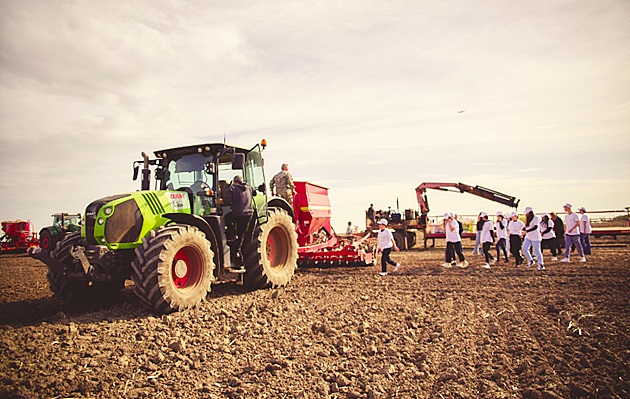868

Over 4,000 students studying at agricultural high schools in Romania have benefited from study visits along the value chain and Agriculture 4.0 educational packages, or from internships on farms.
Over 150 teachers have participated in working groups and farm visits to familiarize themselves with 4.0 technologies, as well as exchange experiences with high schools from France and Hungary.
Almost 14,000 middle school students have discovered agricultural professions at high school promotion events, and over 4,000 adults (parents, teachers, and school directors) have been informed about the importance of agricultural education.
Additionally, over 6,200 students have participated in entrepreneurial education programs with nearly 300 teachers, and around 2,000 students have participated in the Business Incubator and the National Entrepreneurship Competition.
Fifteen quantitative and qualitative research studies have been conducted in agricultural high schools regarding students' practice, the relationship with agribusiness, school needs, and the relationship with the institutional ecosystem. Numerous policy proposals and funding programs have been submitted to decision-makers in Romania.
These are the results of the projects carried out by the Consortium "Growing through Agricultural Education" (CEA) over the past eight years, at a time when in 2015 many agricultural high schools were on the verge of closure, and professionalization of this profession seemed like a utopia.
From agricultural high schools with no funding for renewing or maintaining the material base, without specialists in the field, with teachers migrating to other fields or retiring, today we are talking about a new face of agricultural education in Romania, with agricultural high schools becoming a real and viable option for students.
The consortium, consisting of five organizations - World Vision Romania Foundation (WVR), Civitas Foundation for Civil Society, Junior Achievement Romania (JAR), Romanian Center for European Policies (CRPE) with the support of the Romanian American Foundation (RAF), has substantially contributed to improving the quality of agricultural education and including it in the agendas of the Ministry of Agriculture and Rural Development and the Ministry of Education, as well as in public funding programs.
Agricultural education in Romania continues to develop in 2024: millions of euros in investments in the 59 agricultural high schools and teacher training programs.
At the end of 2023, the call for Improving the infrastructure of agricultural high schools was launched, offering agricultural high schools the opportunity to make investments in new constructions or interventions in existing constructions (through the rehabilitation/renovation of infrastructure) as well as various school equipment (materials, furniture, digital equipment specific to teaching and practical activities).
The total financial allocation is 43 million EUR, eligible value from the National Recovery and Resilience Plan (PNRR).
Additionally, at the end of March, the Ministry of Education launched for public consultation the Guide for the training of specialty teachers from beneficiary agricultural high schools of the PNRR investment measure. Eligible applicants are agricultural universities, and the total budget is 600,000 EUR.
What projects will be implemented in the next three years in agricultural high schools in Romania by the Consortium "Growing through Agricultural Education"
The World Vision Romania Foundation will develop greenhouse models that will illustrate the principles and practices of sustainable agriculture and 4.0 technologies, parallel with creating a community of practice to stimulate the sharing of ideas, challenges, solutions, and resources between agricultural high schools.
The foundation will award Agriculture 4.0 grants, including the adoption of the educational package "Journey to 2050", organizing study visits for students to farms applying cutting-edge technologies and sustainable environmental practices, and purchasing equipment for demonstrations. WVR will continue to support high school promotion efforts by providing grants and consultancy for the design and implementation of local campaigns.
Several communication webinars will be organized for building strategies and improving communication methods and channels in promotion campaigns.
The Civitas Foundation for Civil Society will award grants "Student's Journey - from student to technician", grants for workplace learning activities: internships for students, creating a workplace learning activity path that a student follows from the 9th grade to the 12th grade, presenting the Student's Journey in community online sessions, and organizing experience exchanges between high schools. Additionally, the foundation will develop and consolidate a community of practice for teachers on workplace learning activities to facilitate knowledge transfer and reciprocal learning among teachers in practice communities.
Junior Achievement Romania will conduct entrepreneurship courses (JUNIOR Entrepreneur - students), the theoretical component of the program, with a hybrid version for 22 agricultural high schools, 44 teachers, and 983 students. Additionally, 90 teachers will participate in training sessions for teachers from agricultural high schools.
The practical component of the program is represented by the national JA BizzFactory™ Incubator, which aims to develop practical entrepreneurial skills, attitudes, and aptitudes, as well as the ability to move from idea to business pilot or start-up.
Within this component, 118 students from ten agricultural high schools will be involved. Over 230 students will participate in Innovation Days, and five agricultural high schools will be supported with grants for entrepreneurial education. The best teams will participate in the Entrepreneurship Competition - national and international editions.
The Romanian Center for European Policies (CRPE) will organize events to connect the agricultural high school community to national and European public policies and best practices, support agricultural high schools in designing strategies and action plans aimed at development closely linked to local/regional agriculture needs and trends.
Additionally, the organization will contribute to improving the skills and motivation of teachers to provide students with innovative, updated technical training using modern resources - Agriculture 4.0 webinars.
Moreover, the CEA Consortium will organize the first "Summer School" for teachers in July 2024, bringing together representatives of the 59 agricultural high schools.




